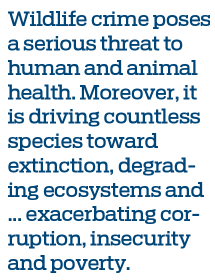Scourge of wildlife trafficking must end
As the world feels the full brunt of the COVID-19 pandemic, which most likely had its origins in wildlife, we are advised that an estimated 1.7 million undiscovered viruses exist in wild animals, half of which could spill over to humans.
Countries all over the world are struggling to combat climate change, while staring down the sixth mass extinction as a result of human activity. These are complex and interrelated global crises, each of which is being exacerbated by the illicit trafficking of wildlife.
Wildlife crime poses a serious threat to human and animal health. Moreover, it is driving countless species toward extinction, degrading ecosystems and their ability to sequester carbon, depriving governments of much needed revenue, and exacerbating corruption, insecurity and poverty.
The World Bank estimates the value of wildlife trafficking at a staggering $1 trillion to $2 trillion a year. The dramatic and sudden loss of revenue from wildlife tourism in 2020 has decimated jobs and livelihoods, and led to a decrease in funding for conservation efforts, making wildlife more vulnerable to poaching.
Yet, despite the deadly consequences of illicit trafficking in wildlife, we have no global agreement on tackling it. We have for too long treated it as a trade-related, rather than a crime-related, issue. The stakes are high and the status quo is not good enough. We need transformative change.
Gabon and Costa Rica may be 10,000 kilometers apart, separated by the Atlantic Ocean, but both nations are standing side by side in calling for a new international agreement to prevent and combat the scourge of wildlife trafficking, This would be the first time that a crime that is seriously affecting the environment is embedded in the international criminal law framework.
Gabon and Costa Rica have some of the most unique biodiversity on the planet. We have set aside marine and terrestrial protected areas and led efforts to combat illicit trafficking of wild fauna and flora. We are promoting nature conservation and recognizing its centrality to protecting biodiversity, combating climate change, preventing future wildlife-related pandemics, ensuring security and generating decent jobs. We are also joining efforts through the High Ambition Coalition for Nature and People, which includes over 60 interregional countries calling for the protection of at least 30 percent of the world's land and ocean by 2030.
Nonetheless, organized criminal gangs continue to illicitly exploit our wildlife in pursuit of personal profit, just as they do in other biodiversity-rich countries, thereby undermining our concerted efforts to achieve sustainability. In their wake they leave our people and ecosystems impoverished.
Today, we reach out to all nations to work with us to ensure that the benefits of wildlife flow to local communities, legitimate investors and the national budgets of source countries, and not to transnational criminal gangs.
If we aspire to meet our global commitments to tackle biodiversity loss and climate change, as well as emerging efforts to prevent future wildlife-related pandemics, then countries must step up and treat wildlife crime as the serious and highly destructive crime that it is.
In the face of these immediate and interconnected crises, we must act swiftly. If we can collectively muster the will to end the scourge of wildlife trafficking, we will leave an enduring legacy for generations to come.

Ali Bongo Ondimba is president of Gabon, and Carlos Alvarado Quesada is president of Costa Rica.














